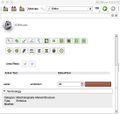Difference between revisions of "2016 Summer Project Week/Segmentation Editor and Terminology"
From NAMIC Wiki
| Line 54: | Line 54: | ||
Assumptions: | Assumptions: | ||
* can expect that Category and Type will be initialized, if not - fall back to default codes (Tissue/Tissue codes) | * can expect that Category and Type will be initialized, if not - fall back to default codes (Tissue/Tissue codes) | ||
| − | * anatomic region may or may not be initialized (example: can specify location of the tumor, but may not be present) | + | * anatomic region may or may not be initialized (example: can specify anatomic location of the tumor, but may not be present) |
* colors may or may not be specified | * colors may or may not be specified | ||
Consequences: | Consequences: | ||
* need to be able to handle these various combinations | * need to be able to handle these various combinations | ||
| − | * if colors are not specified, would be nice to suggest some good default color choices (to optimize differentiation of the structures? lookup of default colors may not be easy) | + | * if colors are not specified, would be nice to suggest some good default color choices (to optimize differentiation of the structures? lookup of default colors may not be easy for medium-large dictionaries) |
| + | * it is not clear that it is a good idea to restrict the choices of terminology (or colors) if a user wants to modify segmentation loaded from DICOM - so it might be helpful to choose from existing color maps / terminology dictionaries for a DICOM-loaded segmentation | ||
==== Creating segmentation from scratch ==== | ==== Creating segmentation from scratch ==== | ||
Revision as of 09:42, 22 June 2016
Home < 2016 Summer Project Week < Segmentation Editor and TerminologyKey Investigators
- Nicole Aucoin (BWH)
- Csaba Pinter (Queens)
- Andrey Fedorov (BWH)
| Objective | Approach and Plan | Progress and Next Steps |
|---|---|---|
|
|
|
Use cases
- Category = Segmented Property Category
- Type = Segmented Property Type (+Modifier, optional)
- Anatomic region (+Modifier, optional)
Loading segmentation from DICOM
Assumptions:
- can expect that Category and Type will be initialized, if not - fall back to default codes (Tissue/Tissue codes)
- anatomic region may or may not be initialized (example: can specify anatomic location of the tumor, but may not be present)
- colors may or may not be specified
Consequences:
- need to be able to handle these various combinations
- if colors are not specified, would be nice to suggest some good default color choices (to optimize differentiation of the structures? lookup of default colors may not be easy for medium-large dictionaries)
- it is not clear that it is a good idea to restrict the choices of terminology (or colors) if a user wants to modify segmentation loaded from DICOM - so it might be helpful to choose from existing color maps / terminology dictionaries for a DICOM-loaded segmentation

